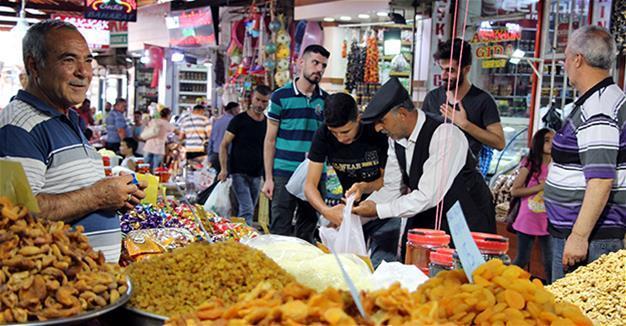Oil prices drive annual inflation back to double digits
ANKARA

AA photo
Turkey’s annual inflation rate stood at 10.68 percent in August, revisiting double digits, with price hikes in cars, oil and LPG becoming the driving force, according to figures by the Turkish Statistical Institute (TÜİK) released on Sept. 5.
Consumer prices rose by 0.89 points, up from 9.79 percent in July, according to TÜİK.
Transport prices rose 17.38 percent, making it the main driver of annual inflation. This contributed 0.34 points to annual inflation alone.
A disease in eggs in Europe boosted demand from Turkey, triggering a 16.85 percent increase in the local price of the commodity and making it the champion of annual inflation in August.
The prices of milk and dairy products also increased, however, the overall increase in food prices was moderate.
Monthly inflation rose 0.52 percent in August since the previous month, above the expectations.
On Monday, state-run Anadolu Agency’s finance desk survey of 14 economists predicted an average 0.15-percent increase in the monthly rate and an annual rate of 10.27 percent. The economists forecast a year-end inflation of 9.38 percent.
TÜİK’s report showed the highest monthly rise was in the education sector, which saw a 2.79 percent increase in prices.
Timothy Ash, a senior emerging-market strategist at the London-based BlueBay Asset Management, said in a client note that the extent of the increase was disappointing, although an uptick was expected.
“The assumption was that inflation would begin to ease back to year-end, due to tax changes, but it will now be from a higher level,” Ash wrote.
Ash added that the figures left little scope for the Turkish Central Bank to ease its current hawkish monetary policy stance any time soon.
“The data will sow doubts about the bank’s ability to keep inflation in check, it has missed its target for many years now and that’s why we’re seeing the lira weaker than other currencies today,” said Jakob Christensen, chief emerging markets analyst at Danske Bank.
Ziraat Bank economist Bora Tamer Yılmaz told Anadolu Agency higher-than-expected inflation numbers were driven by a strong euro and higher commodity prices.
“Some consumer products in the Turkish market originate from Europe and many products are being priced in euros. Durable goods inflation has a higher sensitivity toward euro volatility,” Yılmaz said.
He also stressed on the effect of the Eid al-Adha holiday on transport costs, especially airfares, which increased significantly.
“Airfares have increased by 18.2 percent annually alongside with transportation group items,” he said.
He said he expected the Turkish Central Bank to hold on to its tight stance until improvements are visible in inflation statistics.
Şekir Turan, an economist at Odeabank, told Anadolu Agency that new fixed-weight methodology in inflation calculations, along with price adjustments ahead of the Eid al-Adha holiday, led to a rise in headline inflation in the month.
“Even though, we think the government’s recent measures to reduce the volatility in food prices may be effective in the medium-term,” Turan said.
He added that the rise in inflation rate would continue in the forthcoming months due to foreign exchange rates and cost factors.
The Turkish lira fell in September, underperforming broader emerging markets that benefited from dollar weakness and absence of more rhetoric from North Korea.
The MSCI’s emerging equity index was flat after posting its biggest one-day fall in three weeks on Monday in reaction to Pyongyang’s weekend test of a hydrogen bomb.
With the dollar on the backfoot, most emerging currencies firmed, including the South Korean won which had seen its biggest daily fall on Sept. 4 since January.
